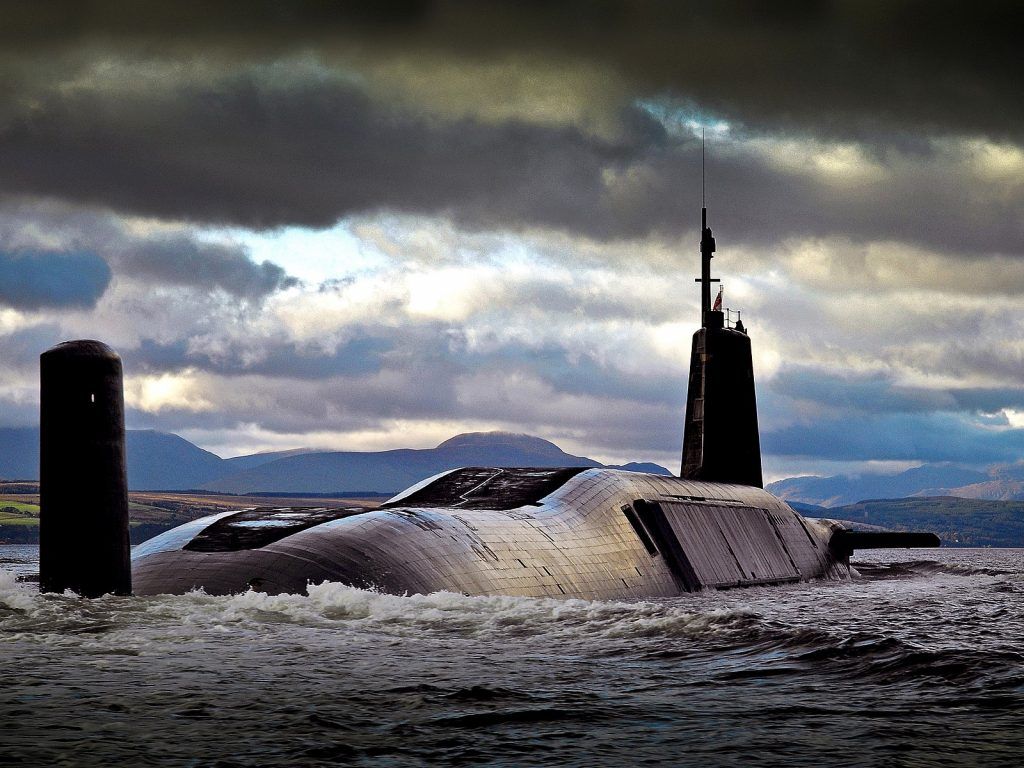Australian-UK-US nuclear submarine deal exposes civilian-military links
By Andy Stirling, Phil Johnstone | November 9, 2021
 HMS Vengeance returning to HMNB Clyde, after completing Operational Sea Training. The trials were conducted in Scottish exercise areas. Credit: Tam McDonald. Accessed via Wikipedia. Licensed under OGL v1.0.
HMS Vengeance returning to HMNB Clyde, after completing Operational Sea Training. The trials were conducted in Scottish exercise areas. Credit: Tam McDonald. Accessed via Wikipedia. Licensed under OGL v1.0.
Under the AUKUS agreement, the United States and the United Kingdom plan to transfer nuclear submarine technologies to Australia. One international security scholar characterized the deal as “a terrible decision for the nonproliferation regime,” noting grave concerns for peace and security worldwide. Others have expressed concerns about “loopholes” surrounding nuclear submarine fissile materials, increased nuclear risks in the Pacific, and a potential acceleration of an arms race in the region. Still others doubt the purported efficacy of nuclear-propelled submarine designs.
Within national borders, nuclear activities often depend on expensive access to specific skills, supply chains, regulatory and design capabilities, educational and research institutions, and waste management and security infrastructures. These dependencies are especially strong in national struggles to build, maintain, and operate nuclear-propelled submarines. The AUKUS announcement overturned normally sacrosanct nuclear secrecy on these matters. It also raised bigger questions about energy policy, climate strategies, and democracy itself.
In democratic nuclear weapons states such as the United States, the United Kingdom, and France, shared civil-military nuclear industrial bases are largely—albeit indirectly—funded by electricity consumers. Colossal investments in new nuclear power are underwritten by anticipated revenues from future electricity sales. These investments flow through nuclear construction supply chains and outward to support military nuclear activities. In this way, crucial support is given to military infrastructures, outside of defense budgets and off the public books. But as civil nuclear power declines, this massive hidden funding flow may diminish, which presents problems for nuclear submarines whose costs are not only often prohibitive but escalating.
The AUKUS deal makes more sense when viewed in light of this crisis in the US, UK, and French national nuclear submarine industries. Spiralling civil nuclear construction delays, technological failures, bankruptcies, and fraud exercise little effect on government commitments to civil nuclear power, given pressure to underpin military capability. This is why these governments are failing to recognize the radical technology and market changes that render baseload power, according to industry, “outdated.” This is why policymakers so often neglect renewables and storage options that are outcompeting nuclear power. This is why some argue that nuclear power must persist as a “necessary part of the mix” in nuclear weapons states, despite diverse alternatives offering sufficient volumes of zero carbon power more quickly and cheaply than can nuclear.
Although well documented in the defense policy documents of existing and aspiring nuclear weapons states, these military drivers have been seriously neglected in discussions of energy and climate strategies. Recently however, some countries have begun to acknowledge the strong connections between civil and military nuclear capabilities.
In the United States, for instance, a report led by former energy secretary Ernest Moniz said in 2017 that “a strong domestic supply chain is needed to provide for nuclear Navy requirements. This supply chain has an inherent and very strong overlap with … commercial nuclear energy.” Since then, multiple high level reports have acknowledged that US military nuclear programs depend on a vibrant civil nuclear sector. “The connectivity of the civilian and military nuclear value chain—including shared equipment, services, and human capital—has created a mutually reinforcing feedback loop, wherein a robust civilian nuclear industry supports the nuclear elements of the national security establishment,” according to one study. Civil nuclear activities transfer an effective value of $26.1 billion dollars to the US military nuclear enterprise, according to this study.
In recent years, French press reports have hinted that dwindling civil nuclear power threatens national military nuclear capabilities. President Macron confirmed this when he said that “without civil nuclear power, there can be no military nuclear power.” Military drivers of civil nuclear activities are also acknowledged in more authoritarian nuclear states like Russia and China.
Australia possesses some of the most abundant and competitive renewable energy resources in the world. Yet the Australian nuclear lobby argues that acquiring military nuclear technology will benefit the claimed imperative to establish a civil nuclear industry. Prime Minister Scott Morrison asserted that he is not pushing for a civil nuclear power program, but other prominent voices disagree. Referring to submarine-derived small modular reactors, Australian politician and UK trade advisor Tony Abbott said that “if nuclear power is ok at sea, pretty soon it will be ok on land, too.” The Minerals Council for Australia claims that acquiring military nuclear technology is an “incredible opportunity” because it “connect[s] [Australia]… to the growing global nuclear power industry and its supply chains.”
Australian civil nuclear proponents welcome the aspirations of military nuclear proponents—and the reverse is also true. Australia’s military is concerned that a lack of a civil nuclear industry may pose difficulties for sustaining nuclear submarine competencies. Australian Navy Admiral Chris Barry pointed out that the absence of a civil nuclear industry left a “big gap” in the country’s ability to manage nuclear submarines. Some argue that a civil nuclear sector in Australia could provide the skills and expertise to enable military nuclear capability. Others are concerned that Australia will be the only country with nuclear submarines but no civilan nuclear industry. Military nuclear ambitions drive otherwise-inexplicable civil nuclear attachments.
In the United Kingdom, some worry about a post-imperial loss of a coveted “seat at the top table” of world affairs. Here again, nuclear submarine capabilities take center stage. Former prime minister Tony Blair worried that relinquishing nuclear capabilities would be “too big a downgrading of our status as a nation.” Meanwhile, detailed official energy policy analyses urged the government to set nuclear plans aside, given trends in renewables and related options. But shortly after a Defence Ministry report on submarine capabilities, Tony Blair swapped the open energy policy consultation for a quicker, covert process, after which the government proclaimed a “nuclear renaissance.”
The Royal Courts of Justice found reasoning for this policy insufficient, but Blair doubled down. “Nuclear power is back with a vengeance,” he said, invoking the name of the recently launched ballistic missile submarine, HMS Vengeance. He did not mention the military rationale. Since then, UK government white papers have failed to justify the country’s civil nuclear commitments—for instance by comparing nuclear costs with those of renewable alternatives. The commitment is taken for granted.
In the United Kingdom, the submarine industry’s openness about military pressures for civil nuclear power contrasts with energy policymakers’ silence. Now-declassified defense reports express grave worries that faltering civil nuclear programs undermine provision for essential military skills. Submarine-builder BAE Systems admits that funding for civil programs “masks” military costs. Naval reactor manufacturer Rolls Royce states that their expensive, government-funded efforts on ostensibly civilian small modular reactors can “relieve the burden” on Defence Ministry efforts to retain skills and capabilities for military programs. Numerous other government documents highlight synergies between civil and military nuclear skills. Yet when challenged, the UK Government denies that civil nuclear commitments influence military activities.
Boris Johnson emphasized that the AUKUS deal offers the United Kingdom “a new opportunity to strengthen Britain’s position as a science and technology superpower, and … could reduce the cost of the next generation of nuclear submarines for the Royal Navy.” Indeed, as discussed in this publication, the deal is “…likely to have particular significance for the UK’s nuclear program” because “the UK is struggling through a number of issues related to the revamping of its nuclear enterprise.” Despite government denials, Johnson’s statement confirms that the AUKUS deal is influenced by the same cost pressures and economies of scale associated with dogged maintenance of a shared civil-military industrial base.
In failing fully to investigate this link between military nuclear and civil energy policy, the UK media have also missed more intimate connections. The senior Energy Ministry figure who negotiated the extraordinarily costly electricity contracts with France from the sole UK nuclear power plant currently under development went on to become the leading official in the Defence Ministry. This same individual confirmed under questioning by Parliament that the nuclear submarine program is connected to civil nuclear policy. And it is this same person who is reported to have played a lead role in brokering the AUKUS deal.
In the United Kingdom, France, the United States, and Australia, policies in non-military, non-nuclear areas are often shaped by military nuclear interests. The AUKUS alliance is driven, in part, by a longstanding crisis in the nuclear submarine industry’s efforts to realize economies of scale. In these countries, energy policy is steered towards risky, costly, delay-prone nuclear options rather than alternatives. In the process, policymakers impede progress on vital climate targets. Throughout, the public remains unaware. So, the gravest damage inflicted by hidden nuclear military interests is not their warping effects on non-military policy but on the health of democracy.
Together, we make the world safer.
The Bulletin elevates expert voices above the noise. But as an independent nonprofit organization, our operations depend on the support of readers like you. Help us continue to deliver quality journalism that holds leaders accountable. Your support of our work at any level is important. In return, we promise our coverage will be understandable, influential, vigilant, solution-oriented, and fair-minded. Together we can make a difference.
Keywords: AUKUS, Australia, United Kingdom, United States, nuclear energy, nuclear risk, nuclear submarine, nuclear weapons
Topics: Nuclear Energy, Nuclear Risk, Nuclear Weapons
















I would say take the last paragraph of the article and consider it our thesis statement, and begin writing again. It could be so much clearer and direct.
Civilian nuclear power not a viable future source of power in Australia.? Why not encourage both civilian nuclear power and take advantage of its utility in managing a nuclear fleet ?
Are the Editors fully aware of the historic close co-operation between civilian and military nuclear facility applications ? Is the argument being made that without a significant civilian nuclear power industry Australia should be denied to nuclear submarine propulsion ? The subs proposed do not include nuclear weapons systems. Is their something inherently wrong with major US allies having efficient long duration nuclear propelled vessels ? Or is the issue here that both nuclear propelled vessels and nuclear electric utility ought be discouraged ? And that the future is solely wind power and huge arranges of solar cells ? Even… Read more »
These subs use highly enriched uranium, which means the country using them must be considered as a highly likely nuclear weapon country.
I agree with David Marshall Jr that the final paragraph is the clearest and most significant. However, I do not think renewables alone will be enough to power this teeming hungry planet. No one ever talks about Thorium as an alternative fuel for electricity producing power stations. It was discarded early on as IT DOES NOT PRODUCE PLUTONIUM. The waste products are much less dangerous and the process itself can effectively be switched off at a moment’s notice. Look it up!! Given the trillions of dollars constantly looking for lucrative investments, this is one that could resolve the climate crisis… Read more »
You’re promoting thorium because “it does not produce plutonium?” But to be converted from a “fertile” to a “fissile” material, thorium must be irradiated with neutrons to produce uranium-233. U-233 works just as well to make nuclear weapons as nuclear reactors. In fact, the US made and successfully tested a U-233 weapon.
@Ole: you are correct about the thorium fuel cycle and the use of U-233 for weapons. It’s included in the IAEA’s definition of special fissionable material. Thorium isn’t new either — the Indians have been trying to make a go of it for decades. Even fusion has some minor proliferation risks, although it would be vastly preferable to fission.
Nothing is mentioned of the naval domination of the seas policy by USA against China (mainly in its own coastal seas) and its huge commertial cooperation with Australia. I hardly believe this is no reason for the AUKUS nuclear submarine issue.
There´s also the coal supply/pollution issue. (remember COP26)
Kudos to the authors for teasing out some of these connections. However, it is a little more complicated than it appears. In the US, the naval nuclear program is quite separate from civilian industry and does not depend on the same supply chain, despite what think-tank reports (from CSIS and Atlantic Council) suggest. Regulatory practices also diverge significantly for naval reactors. The motivation for these reports is to plumb the depths of the defense budget for funds to prop up a failing US nuclear industry. The $780B DoD budget provides a lot of room to hide otherwise unjustifiable programs. In… Read more »